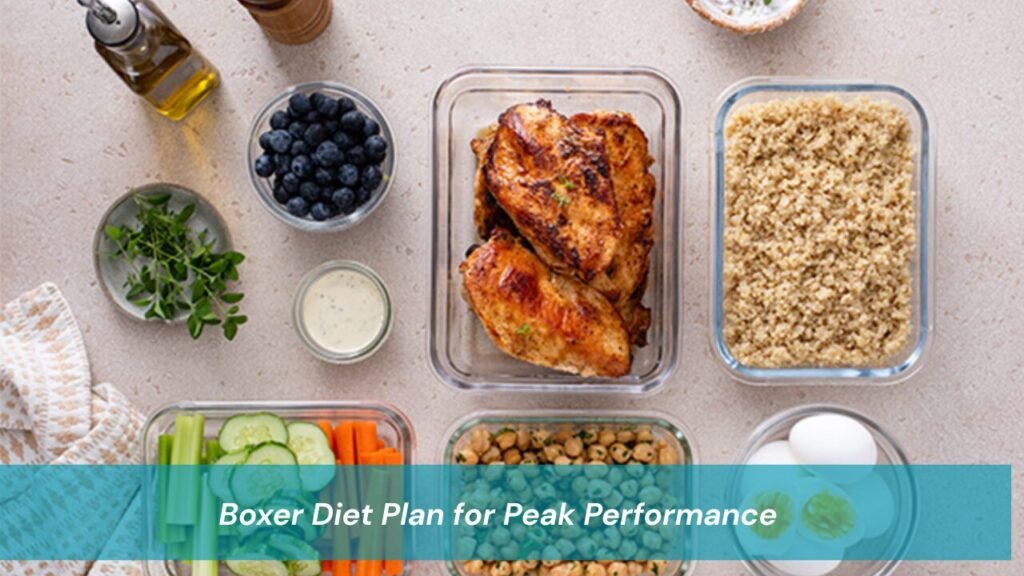If you’ve ever wondered how professional boxers fuel their bodies to handle brutal training sessions, rapid recovery cycles, and fight-night performance, the answer lies in their diet. A boxer diet plan is not just about eating clean, it’s a calculated, strategic approach to nutrition that directly impacts strength, endurance, and mental sharpness inside the ring. Unlike casual fitness diets, this nutrition system is designed for athletes who push their bodies to the limit.
In this comprehensive guide, we’ll break down the essential principles of a boxer’s diet, explore sample meal plans, examine foods to avoid, and provide insights from experts and fighters themselves. Whether you’re a beginner just starting boxing training or a fitness enthusiast who wants to eat like a champion, this article will show you how to structure your nutrition for peak performance.
Key Takeaways
- A boxer’s diet is strategically designed to optimize energy, endurance, strength, and recovery during intense training and fights.
- Proper macronutrient balance carbohydrates for energy, proteins for muscle repair, and healthy fats for hormone regulation is crucial.
- Hydration, electrolyte balance, and meal timing significantly impact performance, recovery, and weight management.
- Avoiding processed foods, sugary drinks, and alcohol ensures consistent energy levels, faster recovery, and peak physical condition.
Why a Boxer Diet Plan Matters
Boxing is often referred to as one of the most demanding sports in the world, not only because of its intensity but also due to the wide range of physical and mental demands it places on an athlete. A fighter cannot rely on raw talent alone; they need stamina to go the distance, explosive power for punches, quick recovery between rounds, and the mental clarity to react to their opponent’s every move. All of this is supported by nutrition.
A proper boxer diet plan ensures that the athlete has the necessary fuel for high-volume training, which can involve hours of cardio, strength work, sparring, and technique drills. It also ensures that lean muscle mass is preserved while body fat is minimized, keeping the fighter agile without sacrificing strength. Perhaps most importantly, nutrition directly influences recovery. Without the right balance of nutrients, a boxer would face chronic fatigue, sore muscles, and an increased risk of injury.
While many people assume boxing is only about physical toughness, it’s the synergy of training and diet that separates elite fighters from average ones. A balanced, well-planned diet can provide the edge in performance that turns a close fight into a victory.
Core Principles of a Boxer Diet Plan
The nutrition strategy of a boxer is built around precision, and it must be tailored to each individual’s weight class, training intensity, and personal body composition. However, there are fundamental principles that nearly all fighters follow.
Balance of Macronutrients
One of the most important aspects of a boxer diet plan is macronutrient balance. Carbohydrates, proteins, and fats each serve unique purposes. Carbohydrates typically make up the largest share of a boxer’s diet, ranging between 45 to 55 percent of daily intake. This is because carbohydrates are the body’s preferred energy source during high-intensity training and sparring sessions. Complex sources such as whole grains, brown rice, oats, and sweet potatoes provide slow-releasing energy that fuels endurance and prevents fatigue.
Protein is equally vital, accounting for 25 to 35 percent of the diet. The constant muscle breakdown that occurs during strength training, heavy bag work, and sparring requires immediate repair, and protein provides the building blocks for recovery and muscle growth. Fighters often rely on lean protein sources such as chicken breast, turkey, eggs, fish, and plant-based alternatives like lentils or tofu.
Finally, fats make up about 15 to 20 percent of daily intake. While fats are sometimes unfairly demonized, healthy fats play an essential role in hormone regulation, joint health, and long-lasting energy. Avocados, nuts, seeds, olive oil, and fatty fish are common sources that boxers include in their diet.
Hydration and Electrolyte Balance
Another critical element of a boxer’s diet is hydration. Fighters sweat excessively during training, losing both water and electrolytes at a rapid rate. Dehydration not only reduces physical performance but also impacts concentration and reflexes, which are crucial in the ring. Boxers prioritize water throughout the day, but they also replenish electrolytes through drinks containing sodium, potassium, and magnesium. Coconut water, diluted sports drinks, or electrolyte supplements are often used to keep hydration levels stable.
Meal Timing and Frequency
Meal timing can make the difference between feeling energized during a workout and hitting a wall mid-session. Pre-training meals usually consist of light, carbohydrate-rich options that provide quick energy, such as oatmeal with banana or rice cakes with peanut butter. After training, boxers focus on consuming a combination of protein and carbohydrates to replenish glycogen stores and stimulate muscle repair for example, grilled chicken with rice and steamed vegetables.
During fight week, adjustments are often made to manage weight. Many fighters slightly reduce carbohydrates to shed water weight while maintaining high protein intake to preserve lean muscle. Hydration is carefully monitored, and sodium intake may be controlled to prevent unnecessary water retention.
A Sample Boxer Diet Plan
To understand how these principles are put into practice, let’s look at a sample day in the life of a boxer’s diet.
Breakfast often begins with a balance of protein, complex carbohydrates, and healthy fats. A typical meal might include scrambled eggs with spinach and avocado on the side, paired with a bowl of oatmeal topped with blueberries for antioxidants and slow-releasing energy. Green tea or black coffee may be added for a mild energy boost without excess sugar.
Mid-morning snacks help keep blood sugar levels stable and prevent energy crashes. A protein shake blended with banana and almond butter provides both quick carbohydrates for energy and protein for muscle support.
Lunch is typically a more substantial meal centered around lean protein and complex carbohydrates. For instance, grilled salmon with quinoa and roasted vegetables offers omega-3 fatty acids for inflammation control, along with essential vitamins and minerals. A fresh side salad with olive oil dressing ensures additional fiber and micronutrients.
In the afternoon, boxers often include a lighter snack to prepare for evening training sessions. Greek yogurt with chia seeds and a handful of nuts offers a mix of protein, probiotics for gut health, and healthy fats for sustained energy.
Dinner focuses on post-training recovery. Lean chicken breast served with brown rice and steamed broccoli ensures glycogen replenishment and muscle repair. A baked sweet potato might also be included for extra carbohydrates, helping the body refuel overnight.
Before bed, some fighters opt for a light evening snack such as cottage cheese drizzled with honey. The slow-digesting casein protein in cottage cheese supports overnight muscle recovery, while a touch of natural sugar helps stabilize glycogen levels.
Foods Boxers Avoid
Just as important as what boxers eat is what they avoid. Highly processed foods, sugary drinks, and fried items have no place in a serious boxer diet plan. These foods provide empty calories, increase inflammation, and can cause energy spikes followed by crashes. Excess alcohol is also avoided, especially during fight camp, as it dehydrates the body, disrupts sleep quality, and impairs recovery. By maintaining dietary discipline, fighters ensure their bodies remain in peak condition.
Expert Insights and Real-World Experience
Sports nutritionists emphasize that boxers should consume between 1.6 to 2.2 grams of protein per kilogram of body weight each day. This range allows fighters to repair muscle tissue efficiently while supporting lean growth. In addition, carbohydrates are cycled depending on training intensity. For example, on days with heavy sparring or cardio, carbohydrate intake is increased, while on lighter recovery days, the intake is reduced to avoid unnecessary weight gain.
Professional fighters often share insights into their routines. Canelo Álvarez has credited his clean eating habits and structured diet as essential to his endurance in long fights. Anthony Joshua, on the other hand, consumes large amounts of complex carbohydrates to sustain his training volume but keeps his fat intake relatively low to remain lean and explosive. These examples show how diet is personalized but always built on the same foundational principles.
FAQs
What should a boxer eat before a fight?
A boxer’s pre-fight meal is carefully planned to provide sustained energy without causing digestive discomfort. Typically, it includes lean protein and complex carbohydrates, such as grilled chicken paired with rice and steamed vegetables. The meal is eaten three to four hours before the fight, allowing time for digestion while ensuring glycogen stores are topped up.
Do boxers eat carbohydrates at night?
Yes, many boxers eat carbohydrates at night, particularly when training volume is high. Carbohydrates consumed in the evening help restore glycogen stores depleted during the day and prepare the body for the next morning’s session. Sweet potatoes, brown rice, or quinoa are common nighttime carbohydrate choices.
Can boxers follow a vegetarian or vegan diet?
It is entirely possible for boxers to thrive on a vegetarian or vegan diet. The key is careful planning to ensure adequate protein intake. Plant-based sources such as beans, lentils, tofu, tempeh, and quinoa can replace animal protein. Additionally, vegan athletes often supplement with B12, iron, and omega-3s to avoid deficiencies.
How many calories does a boxer need daily?
The daily caloric requirement varies widely depending on a fighter’s weight class and training schedule. On average, a boxer in heavy training may need between 2,500 and 4,000 calories per day. Larger athletes with intense workloads may require even more, while smaller fighters with lower training volumes may fall toward the lower end of the range.
What supplements do boxers use?
While whole foods are the foundation of any diet, supplements can provide additional support. Protein powders, BCAAs (branched-chain amino acids), and creatine are popular choices. Omega-3 capsules, multivitamins, and electrolyte powders are also commonly used to ensure all nutritional bases are covered.
Conclusion
A boxer diet plan is more than just a meal schedule; it’s a complete strategy designed to maximize energy, enhance recovery, and maintain peak performance. The careful balance of macronutrients, hydration, and meal timing ensures fighters can handle the demands of training while staying lean and strong.
For anyone looking to adopt the principles of a boxer’s diet, the key is consistency. You don’t need to be a professional fighter to benefit from this approach everyday athletes, fitness enthusiasts, and even those looking to lose weight can learn from how boxers fuel their bodies.
If you are serious about boxing or intense athletic training, consider working with a certified sports nutritionist who can personalize your diet to your specific needs. Just like in boxing, success in nutrition comes from discipline, planning, and dedication. With the right approach, you can eat, train, and perform like a champion. Vist Boxing Essential to explre more.




